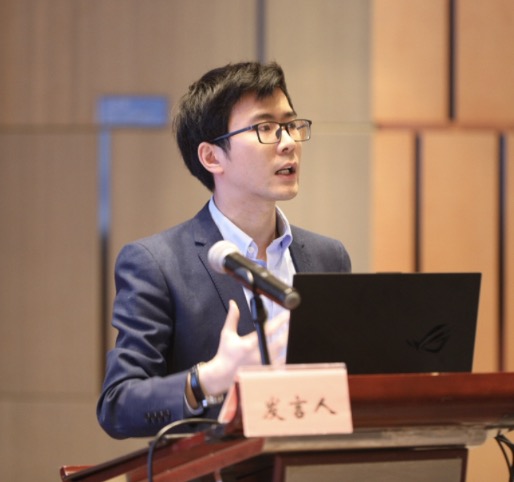On July 26, 2025, the U.S. Coast Guard’s issued a statement on its Facebook account claiming that the “China-flagged research ship Xue Long 2 was detected within the U.S. Extended Continental Shelf (ECS) in the U.S. Arctic, approximately 290 nautical miles north of Utqiagvik, Alaska.” It further stated that a “Coast Guard C-130J Hercules fixed wing aircraft from U.S. Coast Guard Air Station Kodiak responded to the Xue Long 2.” At the time of the incident, the Xue Long 2 was “130 nautical miles inside the ECS boundary.” The statement specifically quoted Rear Admiral Bob Little, Commander of the U.S. Coast Guard District, who said, “The U.S. Coast Guard, alongside partners and other agencies, vigilantly monitors and responds to foreign government vessel activity in and near U.S. waters to secure territorial integrity and defend sovereign interests against malign state activity.”[1]

Chinese Research Ship Xue Long 2 Source: U.S. Coast Guard
This article will analyze the legal nature of the actions of the Xue Long 2 and the USCG aircraft involved in this incident. It will then examine the legal uncertainties surrounding the U.S. claim to an “extended continental shelf”, thereby revealing the “double standard” inherent in the U.S. authorities’ version of “freedom of the seas” and its nature of running counter to the international rule of law.
The Xue Long 2 Was Exercising Freedom of the Seas Under International Law
To analyze the legal nature of the Xue Long 2’s actions at the time, it is first necessary to determine the nature of the maritime zone it was in. According to Article 57 of the 1982 United Nations Convention on the Law of the Sea (UNCLOS), “The exclusive economic zone shall not extend beyond 200 nautical miles from the baselines from which the breadth of the territorial sea is measured.” According to the USCG’s statement, the Xue Long 2 was “discovered” approximately 290 nautical miles off Utqiagvik, Alaska. This unequivocally places the vessel outside the U.S. exclusive economic zone (EEZ) and within the high seas.
Article 87 of UNCLOS explicitly recognizes “freedom of navigation” as a fundamental “freedom of the high seas”. As Professors Donald R. Rothwell and Tim Stephens point out, “the listing of the freedom of navigation in Article 87(1)(a) of the LOSC as the first freedom of the high seas recognises its iconic character. This provision reflects considerable state practice and customary international law.”[2] Similarly, “freedom of scientific research” is also explicitly listed among the “freedom of the high seas” in Article 87 (1)(f). This means that research vessels of all states, including China’s Xue Long 2, have the right to conduct marine scientific research for peaceful purposes on the high seas, subject to the conditions stipulated by UNCLOS and other rules of international law. This right is reaffirmed in Article 257 of UNCLOS, which states, “All States ... have the right … to conduct marine scientific research in the water column beyond the limits of the exclusive economic zone.”
The question then arises: did the Xue Long 2’s activities in this area potentially violate other provisions of UNCLOS or other rules of international law? According to the USCG’s statement, the vessel was located “130 nautical miles inside the ECS boundary” at the time. The statement also emphasized the USCG’s role in monitoring and responding to foreign government vessels to “secure territorial integrity and defend sovereign interests”.[3] It is beyond doubt that the extended continental shelf, like the EEZ and the continental shelf within 200 nautical miles, is not an area where the coastal state possesses territorial sovereignty. It is merely a maritime zone under national jurisdiction where the coastal state enjoys specific sovereign rights. As Professor Alexander Proelss notes, “The historical background evidences that the concept of ‘sovereign rights’ is not tantamount to ‘sovereignty’, and that the EEZ is thus a zone that does not belong to the coastal State’s territory.”[4] Consequently, maritime zones where sovereign rights exist are unrelated to “territorial integrity”.
Given that the USCG’s statement specifically emphasised that “the U.S. has exclusive rights to conserve and manage the living and non-living resources of its ECS”, it can be inferred that the U.S. implicitly suggested the Xue Long 2 might have “infringed” upon U.S. “sovereign interests” (i.e., sovereign rights) over its claimed extended continental shelf. However, to date, the U.S. has provided no compelling evidence demonstrating that the Xue Long 2 was engaged in any marine scientific research activities targeting the U.S. extended continental shelf at the time of the incident.
Furthermore, Article 78 of UNCLOS explicitly states: “The rights of the coastal State over the continental shelf do not affect the legal status of the superjacent waters or the airspace above those waters. The exercise of the rights of the coastal State over the continental shelf must not infringe or result in any unjustifiable interference with navigation and other rights and freedoms of other States as provided for in this Convention.” [5] Based on this, it can be concluded that the Xue Long 2 was not engaged in activities that could be construed as “infringing” U.S. sovereign rights over the extended continental shelf. Instead, it was lawfully exercising the freedom of the high seas, fully consistent with UNCLOS and other rules of international law.
The U.S. Coast Guard Aircraft’s Surveillance Constitutes an Unlawful Interference with the Xue Long 2’s Exercise of Freedom of the Seas
As established above, when the USCG aircraft “responded” to the Xue Long 2, the vessel was operating on the high seas, exercising either freedom of navigation or freedom of scientific research. The so-called “response” by the USCG aircraft, involving surveillance and tracking, constitutes an unlawful interference with the Xue Long 2’s exercise of high seas freedoms. As Professor Yoshifumi Tanaka emphasises, “the freedom of the high seas means that the high seas are free from national jurisdiction.”[6] Article 89 of UNCLOS also unequivocally states: “No State may validly purport to subject any part of the high seas to its sovereignty.” Unlike the U.S. Navy surveillance vessel USNS Impeccable (T-AGOS-23), the Xue Long 2 belongs to the Polar Research Institute of China. It is not a warship or a military survey vessel; it is a veritable civilian research vessel dedicated solely to scientific purposes. The vessel carries no weapons and poses no conceivable “potential threat” to the security of any coastal state. The U.S. deployment of a large Coast Guard aircraft to surveil and track such a purely scientific vessel, ostensibly to “prevent” it from “infringing” upon U.S. extended continental shelf rights, constitutes, in reality, an attempt to disrupt the Xue Long 2’s normal exercise of the freedom of the seas guaranteed by UNCLOS.
Not a Digression: The Legal Controversy Surrounding the U.S. Unilateral “Extended Continental Shelf” Claim
Even assuming, arguendo, that the Xue Long 2 was indeed conducting scientific research on the seabed at the time, this would still not violate UNCLOS or other rules of international law. The U.S. has not yet ratified UNCLOS. As a non-State Party to the Convention, its entitlement to claim an extended continental shelf is highly contentious.[7] As Professor Suzette V. Suarez asserted, “There is a widely accepted view that the continental shelf beyond 200 nm is not part of customary international law. This type of continental shelf does not exist anywhere else except as provided for in the Convention. Therefore, states that are not parties to the Convention should not and cannot benefit from it without the attached responsibilities.” [8] Tommy Koh, President of the Third United Nations Conference on the Law of the Sea at its final session, also stated: “a State which is not a party to this Convention cannot invoke the benefits of Article 76.” [9]
Nevertheless, the U.S. has long claimed that it respects most provisions of UNCLOS and that, even without joining the Convention, it can assert rights to an extended continental shelf based on customary international law. Meanwhile, however, it refuses to accept the constraints established by UNCLOS and is unwilling to undertake the corresponding obligations. [10] While both UNCLOS and customary international law recognize the inherent right of all coastal states to a continental shelf, UNCLOS does not grant non-States Parties the right to unilaterally define the limits of their extended continental shelf without submitting data to the Commission on the Limits of the Continental Shelf (CLCS). According to Article 76(8) of UNCLOS, a coastal state intending to establish a continental shelf beyond 200 nautical miles must submit geological and geophysical data to the CLCS. The Commission reviews the submission and makes recommendations. The outer limits established by the coastal state on the basis of these recommendations are “final and binding”. This procedural step is the core mechanism and the only internationally recognized procedure under the UNCLOS framework for determining the boundary between the extended continental shelf and the international seabed area (the Area). [11]
Indeed, the CLCS was established precisely to “ensure that continental shelf of a coastal State does not extend beyond the limits provided for in Article 76(4), (5) and (6) of the LOSC and thus preventing the continental shelf from encroaching on the Area and its resources, which are the common heritage of mankind.”[12] Moreover, customary international law has not developed rules for establishing an extended continental shelf outside the UNCLOS framework. This means that even if the U.S. has a right to claim an extended continental shelf, the legitimacy of the scope of that claim cannot be unilaterally determined by the U.S. itself. Consequently, China clearly has no obligation to recognize the limits of the U.S. extended continental shelf as unilaterally proclaimed. Indeed, since the U.S. unilaterally declared its extended continental shelf limits in December 2023 [13] , China [14] and Russia [15] have formally objected.
Finally, Article 256 of UNCLOS explicitly states that “All States... have the right to conduct marine scientific research in the Area.” Therefore, the USCG has no right to interfere with the Xue Long 2 conducting normal scientific research activities in the international seabed area.

Foreign Ministry Spokesperson Wang Wenbin’s Regular Press Conference on April 20, 2024
The American-Style Double Standard on Freedom of the Seas Runs Counter to International Rule of Law
Although not a State Party to UNCLOS, the U.S. authorities consistently portray themselves as the guardians of freedom of the seas and self-appointed custodians of the UNCLOS order. [16] Since the 1980s, U.S. naval vessels and aircraft have frequently conducted so-called “Freedom of Navigation Operations” (FONOPs) in the maritime and airspace near other coastal states. The U.S. also maintains a significant, frequent, and often unfriendly military presence, including close-in reconnaissance, military surveying, and wargaming, within the jurisdictional maritime zones (such as EEZs) of other coastal states, including China.[17]
Conversely, when non-military vessels of other states lawfully exercise freedom on the high seas far from U.S. shores, the U.S. reacts with unwarranted hypersensitivity, readily deploying ships and aircraft to “respond”. This starkly reveals the “double standard” inherent in the American version of freedom of the seas. The Xue Long 2 Incident once again demonstrates that this is not merely a flaw in isolated U.S. actions, but rather a systemic tendency towards “American exceptionalism”. [18]
This approach not only contravenes the principle of equality under international law and the spirit of multilateralism, but also severely undermines the integrity and authority of UNCLOS. Furthermore, the U.S. act of bypassing UNCLOS and the CLCS to unilaterally assert its extended continental shelf limits constitutes a serious assault on the contemporary international legal order for the oceans, of which UNCLOS is the cornerstone. Clearly, such practices run counter to the spirit of international rule of law and warrant sustained criticism from the international community, particularly UNCLOS states parties. The international community, especially UNCLOS states parties, must remain vigilant, articulate clear positions, jointly uphold the international law-based maritime order, and promote peace, stability, and cooperation in the maritime domain.


